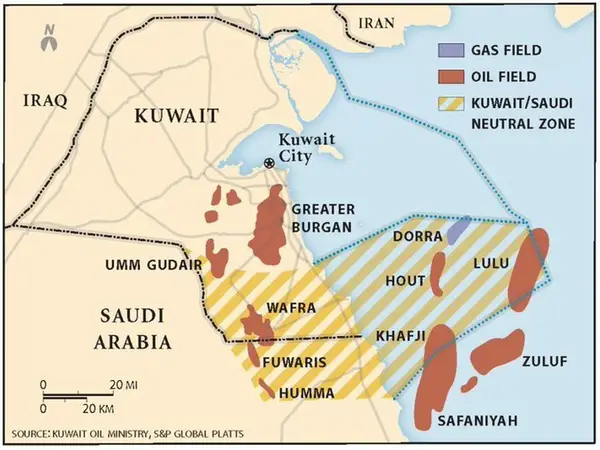A disputed maritime field in the Persian Gulf is becoming a litmus test for the recent détente between Tehran and Riyadh as controversies surrounding it escalate.
Following weeks of bold remarks by Saudi and Kuwaiti officials insisting on their "exclusive rights" in the offshore field, Iran has shown a subdued reaction.
Oil Minister Javad Owji simply said on Wednesday that the foreign ministry will follow up on the Arash/Durra gas field.
Called Arash in Iran and Durra or Dorra by Saudi Arabia and Kuwait -- the offshore field was discovered in 1967 and is estimated to have a total proven reserves of around 310 million barrels of oil and 20 trillion cubic feet of gas.
Owji's low-key reaction followed comments from Kuwait’s Oil Minister Saad Al Barrak on Sunday who reiterated that Iran has no right over the maritime field located in a divided area, and called on the regime to validate its claim to the field by demarcating its own maritime borders first.
"Until this moment, this is an exclusive right of Kuwait and Saudi Arabia in the Durra field, and whoever has a claim must start demarcating the borders. And if it has a right, it will take it according to the rules of international law," Al Barrak said, adding that "The other side (Iran) has claims that are not based on a clear demarcation of the maritime borders.”
The Islamic Republic, which usually is extremely vocal about claims over its territory, has been mysteriously reluctant to speak out about the renewed claims, with Foreign Ministry spokesman Nasser Kanaani only saying on Tuesday that talks about the country’s maritime demarcation are underway with Kuwait. According to him, the most recent legal and technical talks about maritime boundaries between Iran and Kuwait took place in March.
The reluctance to rebuff the claims follow the recent détente between Tehran and Riyadh, making the regime hesitate to react strongly in fear of ruining the recently resumed ties following a China-brokered deal.
Adding insult to the injury, Iran’s close ally Russia has also sided with Arab states of the Persian Gulf in another contentious issue: the sovereignty over the three Persian Gulf islands of Abu Musa, the Greater and Lesser Tunbs, which the United Arab Emirates claims sovereignty over.
The recent developments have become a double-edged sword as the regime is isolated in the international arena and losing face within the country.
Qasem Mohebbali, a former senior diplomat and head of the Middle East division of the foreign ministry, criticized the regime’s foreign policies as the reason why Iran’s allies are teaming up with its regional rivals.
Mohebbali told Entekhab new website in Tehran last week that in keeping with historic trends, China and Russia care more about their relations with Arab countries than with Iran. “Apparently, Iran's friends do not pay much attention to Iran's demands and pay more attention to the rivals’ [Arab] demands,” he said.
The former diplomat showed how hand-tied the regime is in its current international position by his veiled threats. “It is crucial that Russia knows if it pursues such a policy, Iran can likewise adjust its policies on issues such as Crimea and Ukraine,” he said.
The regime has reacted cautiously. In his tweet about this week’s support from Moscow for the UAE’s claims over the three islands, Iranian Foreign Minister Hossein Abdollahian only said that Iran will not tolerate threats against its “independence, sovereignty and territorial integrity”.
On Monday, Chinese Ambassador to Kuwait Zhang Jianwei said the issue of Arash/Durra gas field should be settled through diplomatic dialogue.
Regime loyalists have criticized the government’s inaction vis-a-vis the project. Chairman of the Board of Directors of the Association of Iranian Oil and Gas Drilling Companies, Hedayatollah Khademi, told ILNA news last month: “It seems that we have surrendered the joint fields to the neighbors.”
Highlighting the fact that Riyadh has significantly developed and extracted from joint fields such as Arash/Durra, Farzad-A, Farzad-B, and Forouzan despite the fact that Iran dug the first exploratory wells in the fields, he said, “We have not done anything," accusing the Iranian government of sitting idle in the face of the encroachment.
